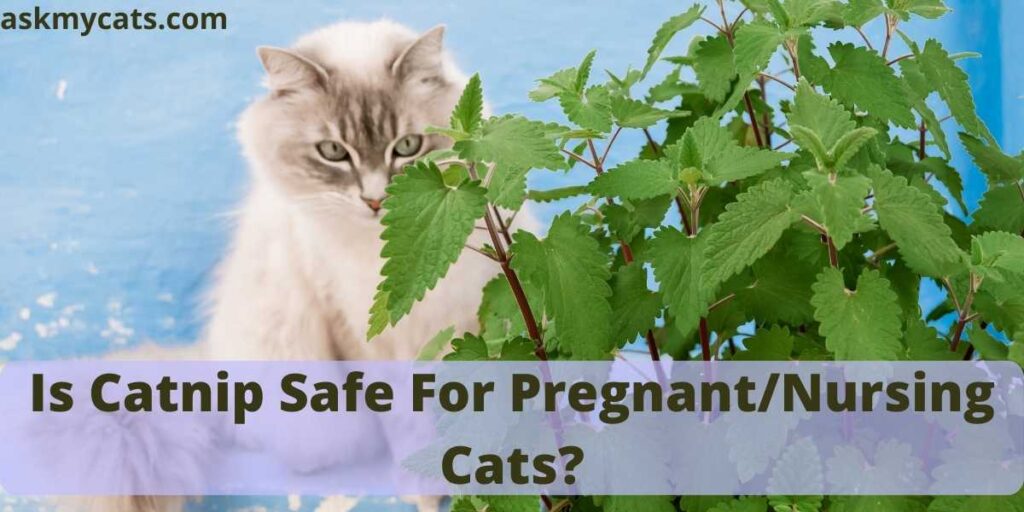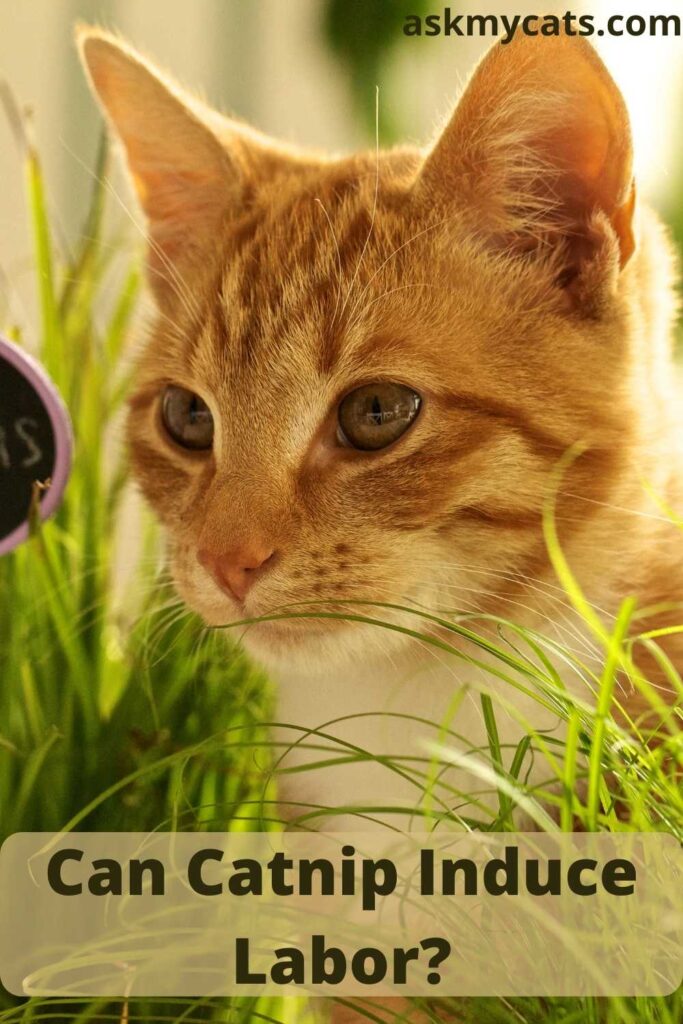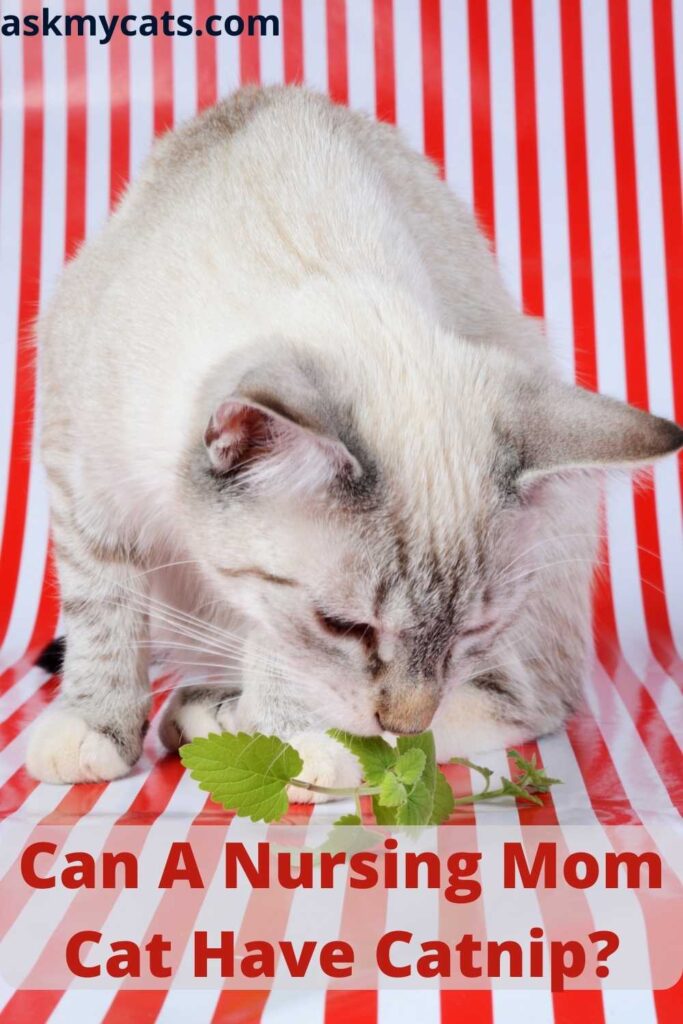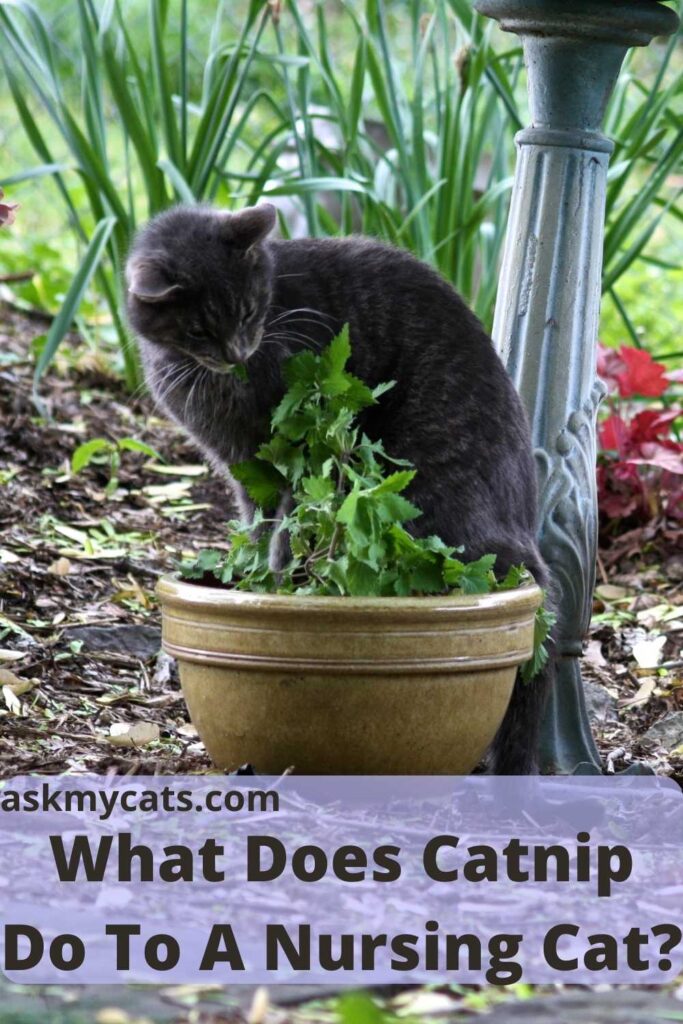Catnip might cause your cat to become feisty and crazed. You might be unsure whether to provide catnip to pregnant/nursing cats despite the fact that it has no negative effects. After all, as a cat owner, your first priority is to ensure that your cat stays content and healthy.
So, is catnip safe for pregnant/nursing cats?
Yes, catnip is safe for pregnant/nursing cats, as it does not have any lasting effects on them. However, you may avoid giving it to your pregnant cat as it might induce labor.
Keep reading this article to know more about the effects of catnip on your pregnant/nursing cats.


Give Your Cat the Perfect Day
Get the Free Ebook!
Can Catnip Induce Labor?
Yes, catnip can induce labor.

Cat owners need not be concerned about catnip overdoses because studies have shown that cats exposed to excessive amounts of catnip have no long-term harm.
However, experts do not recommend using catnip around pregnant cats because it has the potential to induce labor.
Catnip should not be used on pregnant cats since it can cross the placenta and harm the kittens.
Cat owners should also keep catnip away from cats who have seizures, because catnip has been shown to cause seizures in rats, and it is probable that cats will experience the same effect.
Do not use catnip on pregnant cats, as it’s a uterine stimulant and could cause premature labor.
Can A Nursing Mom Cat Have Catnip?
Yes, a nursing mom cat can have catnip.

Catnip can make your cat hyperactive and frisky or it can also stimulate the senses of a nursing cat and calm her down, the reaction depends on the cat.
Although catnip has no negative effects, you may be wondering if it is safe to offer to nursing cats.
After all, as a pet parent, your primary responsibility is to keep your cat happy and healthy.
We conducted research to provide you with the answer.
Nursing cats can consume catnip. However, you must exercise caution not to give them too much.
You must consider the nursing mother cat’s current state. After giving her catnip, you should observe her for any signs of allergic reactions or strange behavior.
If you are unsure, you can always seek advice from your veterinarian before administering catnip.
Although catnip can help your nursing cat become more active, it is recommended to offer it to her in moderation.
Aside from catnip, you must also offer your nursing cat adequate nutrients.
Nursing cats can safely consume catnip. The plant can be infused into cat toys, and most cats enjoy eating or sniffing it as a herb.
Just make careful to offer your cat catnip in small dosages, regardless of the form.
Keep in mind that your nursing cat needs to have enough energy to care for her kittens and heal from pregnancy-related ailments.
Your nursing cat would benefit from eating some catnip to help fight fleas. You might be able to prevent flea anemia in the mother cat and her kittens.
If you are still unsure, make sure to discuss administering catnip to your nursing cat with your veterinarian.
Planning how frequently to feed your nursing cat will be helpful in addition to choosing the sort of food to give her.
To recover and provide milk for the kittens, a nursing cat needs to consume more nutrition. The mother cat’s appetite grows by 50% to 100% more than usual.
It is better to let your nursing cats choose what they want to eat. Your mother cat will be able to devour as much food as she wants as a result.
Alternatively, you can give the cat a standard portion of food every three to four hours. Place food and water so that your cat may always easily and limitless access to them.
After a month, when the kittens wean, the mother cat will come back to her normal eating habits.
It’s okay to provide catnip to nursing cats. Cats consume or sniff the plant, and you can even utilize it as a herb in cat toys.
No matter what form it takes, catnip should only be used in modest doses.
Check out more details: Can Cats Eat Catnip? Is Catnip Safe For Cats?
What Does Catnip Do To A Nursing Cat?
Catnip stimulates the senses of a nursing cat, and eating it calms them down, however, in some cases, catnip can make your nursing cat hyperactive and frisky.

Whether your feline friend is attracted to this oregano and basil relative depends on heredity.
A sensitivity to the herb is inherited by about one in two cats.
However, you won’t be able to tell if your kitten is one of them until it is between 3 and 6 months old.
The appeal of catnip is found in its volatile oil, notably one molecule called nepetalactone.
It only takes one or two sniffs of the miraculous oil, which is present in catnip’s leaves, stems, and seeds, for vulnerable felines to start licking, chewing, and rolling around in feline happiness.
Even though it is strong, this euphoria typically only lasts for around 10 minutes for most cats.
Some cats’ joy manifests as violent playfulness. Others become relaxed and tranquil as a result at the same time.
No of how your cat reacts, it will take them roughly two hours to respond to catnip again once the initial thrill has worn off.
Cats enjoy catnip for two reasons: eating it calms them down and sniffing it boosts their senses.
The stems and leaves of the catnip herb contain a volatile oil that attracts cats. Volatile oils are ones that vaporize in the air.
They behave similarly to female cats in heat when they smell catnip (although male cats can also feel the effects), with erratic movements and odd howling.
Many cats roll around, flip over, rub against everything, and eventually nod out in response to catnip.
This feeling of being outside of fur is brought on by nepetalactone, the oil’s active component.
Experts claim that it attaches to receptors inside the cat’s nose and confuses the sensory neurons there.
The plant, however, has a relaxing effect on cats when they consume it. Ingesting catnip results in drowsiness and acts as a sedative.
Cats who sniff catnip and rub up against the plants will experience more stimulating effects. Your feline family member is safe to consume catnip, both topically and internally.
The best dry foods for cats will keep our furry friends alive because they can’t get by on just catnip snacks.
According to experts, the effects of catnip on your cat only endure between 5 and 30 minutes.
All of this depends on your particular cat, as research indicates that just two-thirds of adult felines are impacted by the plant.
According to experts, about 50% of cats seem to be affected by catnip, and the behavior that results from that behavior varies greatly between individuals.
This sensitivity is inherited, therefore it doesn’t manifest right away. Since young kittens are not impacted, it will take a few months instead.
You can prepare your own catnip crackers for your cat to enjoy if you think the kitty might appreciate a catnip sleep (or a catnip boogie around the room).
If your cat exclusively spends time indoors, you probably worry about their lack of stimulation.
You can’t be there to play with them constantly while they’re awake, after all. According to studies, cats, like all other animals, require mental and physical exercise in order to be happy.
Sniffing or eating catnip might be a part of this enrichment.
Watch out for these subtle indicators that your cat is depressed, as cats who aren’t stimulated enough may become aggressive, melancholy, or worried.
Just be careful not to feed your cat too much catnip, as this might cause nausea or vomiting.
Once a week, a little at a time, is OK. Fresh catnip is more strong than dried, and if your cat develops an upset stomach from eating it, you can put catnip sprays on a favorite toy or scratching post.
Although catnip may appear to be a narcotic, experts say cats are not addicted to it. However, it must be acknowledged that catnip might occasionally make cats aggressive.
To prevent any potential fighting, experts advise introducing catnip to each cat separately in a multi-cat home.
Interesting Read: Does Catnip Calm Cats?
Frequently Asked Questions
Is catnip safe for kittens?
In general, catnip is safe for kittens to consume. Just be cautious not to feed them an excessive amount of dried or fresh catnip. Catnip overdose symptoms include nausea and diarrhea. Your kittens could damage themselves if they run around the house in addition to the health problems. Cats can be injured by furniture and other things. You can give catnip to your kittens as a playful reward if you want to introduce them to it. Give catnip in moderate doses to be safe. If you offer catnip to them frequently, they start to get bored with it. Your cats can self-regulate and disregard catnip if you give them too much.
At What Age Can Kittens Have Catnip?
Catnip is suitable for cats of all ages. When they are at least 6 months to a year old, the majority of kittens will respond to catnip. If exposed to catnip sooner, some cats might react more quickly. Some cats gradually become more sensitive to it as they age. The maturation of a kitten’s sense of smell determines whether or not it can consume catnip. It is very likely that your kittens under three months old won’t respond to catnip. However, you can experiment by giving your kittens tiny doses of catnip to see how they react to it.
Can catnip harm my cat?
Scientific studies have shown that cats and young kittens are not harmed by catnip. If eaten in big quantities, catnip leaves can also result in diarrhea and upset stomachs. Cat treats should occasionally include catnip, but only in moderation. There are no dangerous components in the product, making it entirely safe. Even if it is possible, if your cat drinks a lot of catnip, it is not likely to result in a small stomach upset. An example of a plant is catnip. The perennial herb catnip is a member of the mint family.
Final Words
Your nursing cats and their kittens are safe to consume catnip. Mother cats can benefit from catnip to help ward off fleas and keep them active.
Though mother cats can benefit from catnip, good nourishment should still come first. In order to care for her babies, your nursing cat must be able to recover.
Kittens nurse for a month after birth. Furthermore, until they are at least 6 months old, the majority of kittens might not react to catnip in full. Give the mother and her kittens catnip in very small doses even though it is safe to do so.
If you have any questions, ask us in the comments section.
